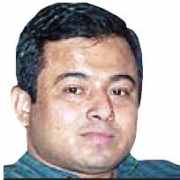Prasenjit Bose- Convenor, Research Unit, CPI (M)
 This year's Budget comes against the backdrop of a slowdown of the Indian as well as the global economy. It is clear by now that the withdrawal of fiscal stimulus measures in the advanced countries was premature and the imposition of austerity measures worsened growth and employment prospects everywhere.
This year's Budget comes against the backdrop of a slowdown of the Indian as well as the global economy. It is clear by now that the withdrawal of fiscal stimulus measures in the advanced countries was premature and the imposition of austerity measures worsened growth and employment prospects everywhere.
The finance minister should avoid the trap of fiscal conservatism and focus on reviving growth, besides addressing the problems of joblessness, inflation, growing income inequalities and generation of black money.
Economic slowdown has already affected central tax revenues, with the government trying to make up for the shortfall through disinvestment and drawing upon the cash reserves of the Central Public Sector Enterprises (CPSEs).
These are short-sighted measures which amount to foregoing future streams of revenue. The CPSEs, which have together accumulated reserves of over Rs 6 lakh crore, should be prodded into making fresh capital investments and contributing to economic expansion.
Gross tax revenue to GDP has fallen consistently, from 11.9 per cent in 2007-08 to 9.5 per cent in 2010-11.
This regressive trend has to be reversed and resource mobilisation efforts stepped up.
The Direct Taxes Code should be modified to tax high income and wealth at enhanced rates. Tax concessions on corporate profits and capital gains should be phased out. Black money stashed away in foreign banks has to be retrieved.
Plan expenditure, which peaked at 5.6 per cent of GDP in 2009-10, has declined to 4.7 per cent in 2010-11. This reflects the waning commitment for the
aam aadmi.
Public expenditure on rural job guarantee, education, healthcare, agriculture and infrastructure should be increased substantively.
Annual growth in employment fell from 2.7 per cent between 2000 and 2005 and to less than one per cent between 2005 and 2010, despite annual GDP growing at over eight per cent during the latter period. This trend of growth in joblessness has to be reversed through public policies.
Rather than losing sleep over subsidies, the finance minister should ponder over the causes that kept food inflation in double digits for 38 months between 2008 and 2011 -- perhaps the longest spell of food inflation in the post-independence period.
Cutting subsidies on food, fertiliser and fuel would once again contribute to cost-push inflation.
